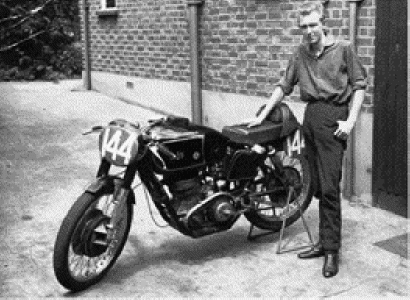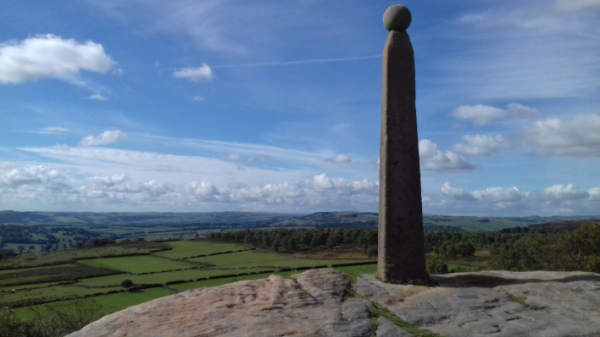Chat 15
Quiz Question Chat 14:- What, where and when?
 Answer:- A Human Chess Match Gets
Played in Leningrad,
1924.
Answer:- A Human Chess Match Gets
Played in Leningrad,
1924.
That's when an unconventional chess match was played by Peter Romanovsky and Ilya Rabinovich, two chess masters of the day. Apparently, they called in their moves over the telephone. Real-life chess pieces, in the form of human beings and horses, were moved across a huge chessboard covering Palace Square. Members of the Soviet Union's Red Army served as the black pieces; members of the Soviet navy were the white pieces.
Correct answers from :- Mick Dughan, Don Eades, Mick Leach, Walter Partington and some close guesses.
Have another go at this one from Chat 14. Two correct answer so far. The young man in the photograph with his first race bike is now of pension age and is a really well known member of the section and the club in general. Answers by by email to edgrew@virginmedia.com

Mick Leach
I
think most of us will probably agree in the wider motorcycle
community that we all share so much in common I am sure we all
feel sad that our activities have been curtailed and that
we don't know when we can go out again. I know that most of us
really appreciate the landscape and the structures created by
our forefathers, the canals steam railways etc.
Personally I have always enjoyed navigational runs and rallies,
one such event worth a mention is the Triumph Owners MCC
Landmark challenge.
For those
who are not familiar 50 landmarks are designated each year with
a clue and map reference. In 2018 Ruth and I took part had a few
days out and an enjoyable weekend in East Yorkshire where we
stayed B&B in the village of Brandesburton had a couple of pints
and ate fish and chips al fresco. We visited twelve of the fifty
landmarks sent the images of our motorcycle next to the twelve
to the organiser at the end of the season and later we both
received a badge to commemorate the event which we put in a tin
probably never to see daylight again. We visited some
interesting places one of which is in our own backyard of
Derbyshire and I attach a picture can anyone recognise the
landmark?

Dana Neal sent this amusing little story:-
A well-known Burton racer who shall
remain nameless arrived at Cadwell Park and parked next to me,
he and I are good friends.
His Yamaha was resplendent with fresh
paintwork and it looked wonderful.
He then said "Dan, could you help me
bleed my brakes please?"
I was always a bit short of humour
before racing started, so replied "So you have had time to paint
it, but brought the blasted thing here with no brakes?"
Anyway, I helped him of course. Some
members may remember the nasty hose system that was common
before we all started to use Aeroquip type hoses as standard. It
was a sort of hard nylon hose and the fittings screwed into it
rather like a self-tapper.
Inevitably, whilst we were bleeding the
master cylinder hose let go and sprayed his new paintwork with
brake fluid .....
Eventually, he had brakes, but we and
the bike were covered in brake fluid.
He said "I've got some brilliant new
hand cleaner; we'll go to the toilet block and get cleaned up.
Lorraine threw a towel over my shoulder and we set off.
He got his Acme hand cleaner out at the
toilets and I said, "Hang on Dave, that's EP90!"
He smiled, "No it isn't I just put it in
this EP90 bottle out of a bigger container".
We squirted it on our hands and tried to
work up a lather. None was forthcoming because it was, of
course, EP90 gear oil.
I'm afraid my language and behaviour
were shameful in the extreme.
Trevor Shakespeare's AJS - Part4.
The time had now come to try to put the newly acquired 3D jigsaw together. Some parts and their locations were pretty obvious, but within a very short time it became obvious that this was nothing like any bike I had previously worked on over the past 50+ years. I had immense help from a great many people from the VMCC. Some parts were worn beyond belief, but others were in virtually unused condition. Many were the bodges and codges that must have been carried out by the village blacksmith. From Pat Davy, I found that the V-twin JAP engine was a 1917 product, so assume that the rest of the Matchless produced parts were also the same year. It seemed as if they had used any available size bar for nuts and bolts and many and varied were the thread sizes and forms. Every hexagon had to be measured and thread pitches and forms checked very carefully.
The "dry build" option proceeded. The fossilised remains of the
tyres were sawn into short sections as they were rock hard.
It was fairly obvious how the engine, gearbox, forks etc. went
together. The myriad of small parts were the main problem,
but as assembly went on gaps would appear and after a search I
could usually find what fitted into the gap. The chain cases and
fuel tank still had original paint and decal in place. Two
layers of paint, the pre-war Matchless green (a sort of mustard
yellow) covered with an army olive drab green. About a
month after the bike had arrived I had an e-mail from my cousin
to say that they were coming to the UK just before Christmas
2014 so I thought that I would try to complete the dry build
before they arrived. Soon it began to look like a
motorcycle. I think we have all heard the old saying "it's
in bits but it's complete". In this case it was almost
true. On completion of the dry build all that appeared to
be missing were a few bolts and studs, the final drive chain,
the front stand and one of the exhaust nuts. Even most of
the control cables and the toolkit were present. There were 2
sets of gas lights and generators, even the gas distribution 'y'
piece and plated split link for the rear chain were there.
Geoff and my cousin, Caen arrived and to put it politely, were
surprised that the machine was reassembled. As I had the number
plates and last tax disc reclamation of the registration number
seemed a good idea. Contact was made with the VMCC Library
who were extremely helpful in putting me in touch with a machine
examiner and the marque specialist and advising on making sure
that all forms were correctly filled in. The DVLA were
quite rapid in there response and the V5C appeared with the
original number. Interest in the machine was high and
there were many visitors who donated there small change, which
was passed on to Cancer Research. Hereabouts should be photos of
the bike and the toolkit.
Now came the real challenge, what to do with the bike?
Part 5 to follow.
MZ’ing Continued:-
Right where did we get to last time? Oh yes, I’d
finally refitted the carb and got the bike started.
After a hearty breakfast of coffee and Aldi corn flakes I
retrieved the MZ from its overnight resting place and armed with
my ‘trusty?’ Haynes book started her up until she was nice and
warm - well as warm as you as you can get an MZ - and with my
electricians yellow screwdriver in my hand I consulted the
Haynes book.
To be honest nothing made much sense - ‘remove the plastic plug
from the pilot screw (there wasn’t one!).Screw the pilot screw
in until it seats tightly then unscrew the pilot screw 3
complete turns and start the engine. Now adjust the
by-pass air screw (what ??) until the engine is running smoothly
(an MZ never runs smoothly) with the engine running slowly screw
in the pilot screw until the idle speed rises to its highest
point, now back off the pilot screw by a quarter of a turn and
if necessary lower the idle speed by backing off the by-pass air
screw until the engine idle speed is 1200 +or- 100rpm then refit
the sealing plug over the pilot screw (I don’t have one - maybe
a problem?) and MZ apparently state that if the engine, ignition
and exhaust system are in good condition the pilot screw should
be 2.5 turns open and the by-pass air screw approximately 4
turns open - phew - time for a lager and a lie down.Anyway
I persevered and low and behold the revs dropped to a nice
steady 1200.Ring-a-ding-ding-ding-ding yes all sounded OK.
OK, I thought I’ll turn it all off, check I tightened everything
up then start it up again - yes everything was tight and ok.
To be continued, yes really!
